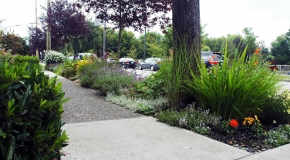
I have found that it is not city administration, policy and budgets that create great communities, but the concepts and ideas of the communities themselves. When planners talk about a three-legged stool of place making and the importance of policy, plan and then community engagement, I have always seen it a bit differently. I think it is important to profoundly listen to what the neighb0urhood is saying, synthesize those concepts, work together, and co-create innovative work that CAN be the foundation for policy. In every instance where I have followed those principles, enhanced walkability and extraordinary examples of placemaking resulted, and city policy has been modified to embrace these demonstration projects as innovative models.
I first met Peter Wohlwend and his wife Midori Oba about 15 years ago, on Windsor Street in Vancouver’s east side. Windsor Street for its 40 blocks in Kensington Cedar-Cottage was a street used for prostitution and traffic short-cutting, and had its share of on-street car racing. Despite the fact the street connected three schools and four parks, people did not walk on the street, leaving it anonymous for the drug and prostitution trade.

Peter and Midori’s house was in the middle of the drug trade opposite Dickens Elementary School. Peter had done a bold thing-he placed a bench outside of his house next to the public sidewalk. What he found extraordinary was that it was not the drug dealers and prostitutes using the bench. The users included the elderly couples that now walked to the grocery store and rested on the bench on their way home, or the parents waiting for the children to come out of the school across the street. The bench was the catalyst for local neighbours to stay on the street, and view the street as a place of respite.

Peter had another idea. In front of every house along Windsor Street was a large city boulevard that Peter felt was perfect for garden planting. Such planting would provide a buffer between the curb and the sidewalk, and could be a conversational catalyst to focus the community on improving the street. By calling this initiative a “demonstration project” and mounding up composted recycled green waste soil above the level of the current soil, new plantings did not interfere with city services below the ground.
Neighbours along Windsor Street had massive “dig in-dig out” parties where dump trucks of composted recycled green waste soil moved to newly prepared boulevard gardens. Windsor Street was closed in sections for these dig in parties, where barbeques were wrangled chuckwagon style in the middle of the street for the celebratory hot dogs. Despite the fact that many of the people on Windsor Street did not speak a common language, Peter always said that “Everyone spoke the language of plants”.

Peter was right. In a short space of time over forty boulevard gardens were built on Windsor Street, and people started to walk on the street. The drug use and prostitution moved off the street as it became a place that was too public for those trades. The Windsor Street community successfully bid for a public art grant, and artist Karen Kazmer installed 20 unique aluminum banners on Windsor Street hydro poles, depicting the hands and activities of Windsor Street residents.

Peter and Midori received the Greater Vancouver Good Neighbour Award from the Greater Vancouver Neighbourhood House Association for their temerity and vision in steering this massive piece of work. Peter and Midori also started up the multicultural festival that was held every spring on the Kingsway Triangle. For many of the local merchants, it was the first time they met the locals in a celebratory way. Of course this also further deepened relationships between the commercial areas and the surrounding residents.
Windsor Street has been named in the best gardened block awards from the Vancouver Garden Club. And the success of blooming boulevards in tying together Windsor Street as a contiguous, walkable street facilitated the street becoming a bikeway with further traffic calming measures. The Blooming Boulevard guidelines are now on the City of Vancouver’s website, and gardening the city boulevard is permissible in any single family area in Vancouver.
Peter Wohlwend passed away on May 29 of this year. His funerary card contains the famous Margaret Mead quote: “Never doubt that a small group of thoughtful, committed citizens can change the world…indeed it’s the only thing that ever has”.
Peter’s coaching and advice made me a better planner and a better citizen, and I talk about his work in my TEDx talk on the Transformative Power of Walking. He will be greatly missed by many.

